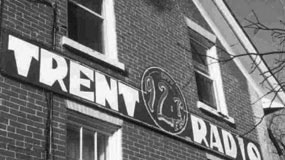
Last month the Canadian Radio and Telecommunications Commission (CRTC) put a call out to National Campus and Community Radio Association (NCRA) to comment on a proposed commission that the NCRA would operate in order to police content and conduct on air. The NCRA, in turn, put a call out to their membership to comment to the CRTC on the proposed code and commission, as well as the CRTC’s idea to have a campus/community specific code and commission to deal with complaints. While there are already several censorship stop gaps in place, the rhetoric of the CRTC’s decision to have the NCRA deal with campus/community censorship issues is that of protecting consumer rights, a commercial radio attitude that reflects the heavily industry-biased CRTC board and interim chair, Len Katz.
Trent Radio was one of the first community stations to comment because the decision to have more censorship is one that directly conflicts with the “producer-oriented” mantra of your community broadcaster. In the intervention prepared by Jacob Donald George Quinlan (local bohemian Hegelian and outstanding radio producer) and John K. Muir (Trent Radio GM) on behalf of Trent Radio, the CRTC’s question, “Is a distinct Code(s) to be applied when adjudicating programming complaints for the campus and community radio sector appropriate?,” is answered in good faith. When asked about the purpose of such an intervention, Quinlan quipped that it was to “obviate cultural hegemony.”
According to the intervention, if a code is needed it should be more comprehensive so as to be more useful to all – complainants, respondents, CRTC, observers, and the general public.” This is a direct hit to the outdated and somewhat irrelevant CAB (Canadian Association of Broadcasters) Code of Ethics, administered by the Canadian Broadcasting Standards Council, that is in place now to deal with listener complaints when it comes to campus/community content. Again, the code is directly in opposition to the idea of producer-oriented radio: “their [broadcasters] first responsibility is to the radio listeners and television viewers of Canada for the dissemination of information and news.” But the clause that specifically deals with radio broadcasting outlines the inappropriate use of “unduly” sexually explicit behaviour, violent behaviour (or the glamourization of such), or course language. This means that “unduly” does some heavy lifting in that it is up to the CRTC and Canadian Broadcasting Standards Council to review and determine whether or not the use of such language or content was “unduly” or not.
Another built in censorship stopgap is in the radio licensing process itself. When applying for a radio license in Canada an organization must make a promise of performance to the Canadian people, and part of that promise is to broadcast to a “high standard.” Again, “high standard” is somewhat vague and any complainants can make a claim that a particular broadcast was not living up to a “high standard.” A radio producer must do their best to produce a well-thought out, purposeful content and if doing so, should not fear being censored. Instead of the rhetoric of protecting consumers, the Trent Radio intervention seeks to emphasis the steps that are already in place to stop oppressive speech and content without infringing on one of the fundamental rights protected by the Canadian Charter of Rights and Freedoms: “freedom of thought, belief, opinion and expression, including freedom of the press and other media of communication.”
Campus and community stations already provide access to “other media and communication” but also provide access to “freedom of thought, belief, opinion and expression.” The intervention specifically states “While we understand that Charter rights are neither absolute, nor do they grant permission to be abusive, we would prefer a clearer articulation that the Charter provides for controversy, unreconciled disagreements, and even the right to offend and be offended.” The commercial system’s anti-oppression measures were famously tested last year in the CHOZfm case against the album version of “Money for Nothing” by the Dire Straights. The CBSC’s final decision to pull the song from all of their stations was deliberated after numerous panels and discussions surrounding the temporal context of the song and the implied and explicit meanings of the word “faggot.”
In the end, the community context of content seemed to be more important than a word itself: “it is understood that language and terminology evolve over time.[…] Broadcasters shall remain vigilant with respect to the evolving appropriateness or inappropriateness of particular words and phrases, keeping in mind prevailing community standards. So under the CBSC’s own admission, what a community takes offence to means more than a homogenized ideal of what is appropriate or inappropriate. As a not-for-profit, the NCRA is obligated to do what’s in the best interest of their membership and as community broadcasters, NCRA members are necessarily building community, making radio, so these issues are best kept within that context.

